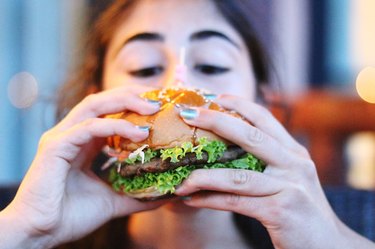
If your doctor has prescribed a beta-blocker, you may be wondering whether there's a special diet to follow, since some drugs require avoiding certain foods. Good news: You may need to limit a few things, but there's not much you have to avoid altogether.
What Are Beta-Blockers?
Video of the Day
Beta-blockers are prescribed for heart-related conditions, including high blood pressure (hypertension), congestive heart failure (CHF), abnormal heart rhythms (arrhythmias) and chest pain (angina), according to the Texas Heart Institute. Beta-blockers may also be used to prevent migraines, says a December 2015 review article in Pain Research and Treatment.
Video of the Day
Beta-blockers work by blocking the effects of adrenaline — a hormone that increases heart rate and raises blood pressure, explains clinical endocrinologist Robert M. Carey, MD, professor of medicine and dean emeritus, University of Virginia School of Medicine. Beta-blockers lower blood pressure by getting your heart to beat more slowly and less forcefully.
Read more: How to Quickly Lower Your Blood Pressure
Preventing Weight Gain
"Some people experience modest weight gain, averaging a little over 2 1/2 pounds, usually during the first few weeks of treatment with a beta-blocker," Dr. Carey says, adding that fatigue can also occur. However, these reactions "usually aren't considered significant enough to withhold treatment, if it's needed," he says.
A healthy diet can help keep your weight down. Healthy eating is important not only to counteract weight gain but because it's generally good for your heart and your whole body.
The 2019 American College of Cardiology/American Heart Association guidelines, published in the September 2019 issue of the journal Circulation, emphasize including fruits and vegetables, nuts, whole grains, lean vegetable or animal proteins, and fish in your diet and minimizing trans fats, red meat (especially if it's processed), refined carbohydrates and sweetened beverages.
Potassium in Moderation
Dr. Carey notes that high potassium levels have occasionally been reported in people taking beta-blockers, so it's wise to avoid large quantities of grapefruit juice, which contains potassium. Additionally, according to the U.S. Department of Health and Human Services 2015-2020 Dietary Guidelines for Americans, baked potatoes, prune juice, tomato products, yogurt, bananas, certain beans, certain types of fish and orange juice also contain potassium.
"These foods don't need to be avoided," Dr. Carey emphasizes. "In fact, they're healthy and eating them is encouraged." The key is to not eat them in excess.
Should I Skip Coffee?
Caffeine is reputed to worsen hypertension, although whether that is always the case isn't clear, according to the Mayo Clinic. On the other hand, research published in December 2016 in the American Journal of Hypertension suggests caffeine may indeed raise blood pressure or make blood pressure medications less effective.
In general, coffee should be safe in moderation while taking beta-blockers, advises Dr. Carey. But if your heartbeat speeds up or you have other symptoms (like jitteriness), it would be smart to find another way to wake up. He encourages exercise — especially aerobic exercise — to counteract fatigue. For example, walking is a free and easy way to incorporate exercise into your daily life, so reach for your walking shoes instead of your coffee mug!
And of course, if you have questions, ask your doctor whether you can safely sip your coffee.
Two More Tips
What could be easier than reaching for that saltshaker? But if you have hypertension, you need to find other ways to flavor your food because, says the American Heart Association (AHA), salt can increase blood pressure. It contains sodium, a culprit in hypertension.
The AHA recommends eating no more than 1,500 milligrams of salt a day if you have hypertension. Remember that many foods contain sodium so read package labels to find out how much sodium is in your food.
Also, avoid alcohol while taking beta-blockers, recommends the Texas Heart Institute. According to a February 2017 study in the Lancet Public Health, alcohol raises blood pressure. Nevertheless, if you enjoy an occasional glass of wine, consult your doctor, who can advise you on how much alcohol — if any — is safe for you to drink.
How to Discontinue Beta-Blockers
If fatigue or lethargy are interfering with daily activities — even if you're exercising and getting enough sleep — talk to your doctor about discontinuing beta-blockers and finding another treatment, Dr. Carey recommends.
But, he warns that it's essential to withdraw beta-blockers carefully because there might be an "abrupt increase in blood pressure" if you withdraw too quickly.
- Texas Heart Institute: “Beta-Blockers”
- Robert M. Carey, MD, MACP, clinical endocrinologist; professor of medicine, dean emeritus, School of Medicine, University of Virginia, Charlottesville
- Pain Research and Treatment: “Evidence-Based Treatments for Adults With Migraine”
- Circulation: “2019 ACC/AHA Guideline on the Primary Prevention of Cardiovascular Disease: A Report of the American College of Cardiology/American Heart Association Task Force on Clinical Practice Guidelines”
- U.S. Department of Health and Human Services: “Dietary Guidelines for Americans, 2015-2020: Appendix 10. Food Sources of Potassium”
- The Lancet Public Health: “The Effect of a Reduction in Alcohol Consumption on Blood Pressure: A Systematic Review and Meta-Analysis”
- American Journal of Hypertension: “Coffee—Antihypertensive Drug Interaction: A Hemodynamic and Pharmacokinetic Study With Felopidine”
- American Heart Association: “Shaking the Salt Habit to Avoid High Blood Pressure”
- Mayo Clinic: “10 Ways to Control High Blood Pressure Without Medication”
Is this an emergency? If you are experiencing serious medical symptoms, please see the National Library of Medicine’s list of signs you need emergency medical attention or call 911.